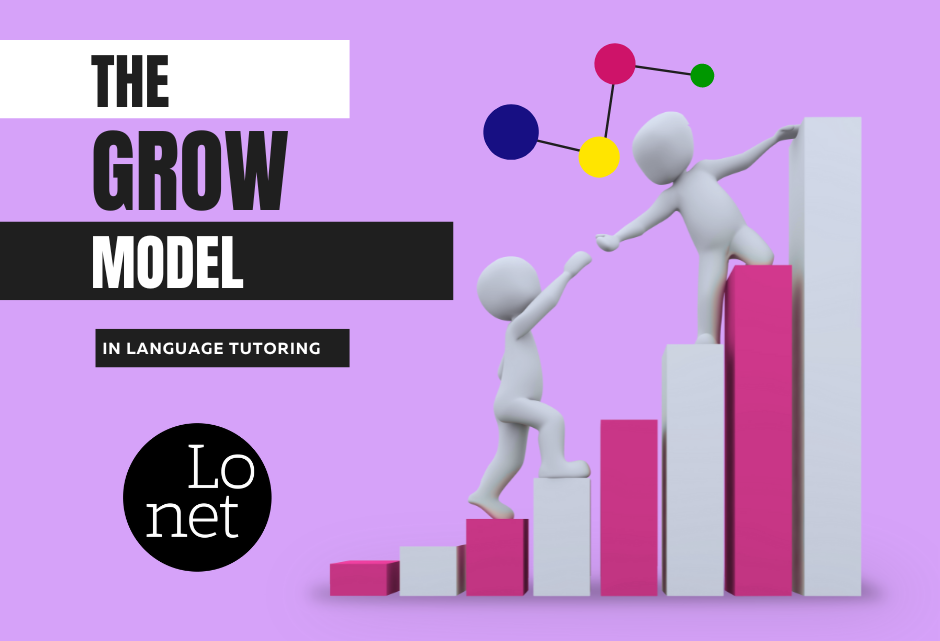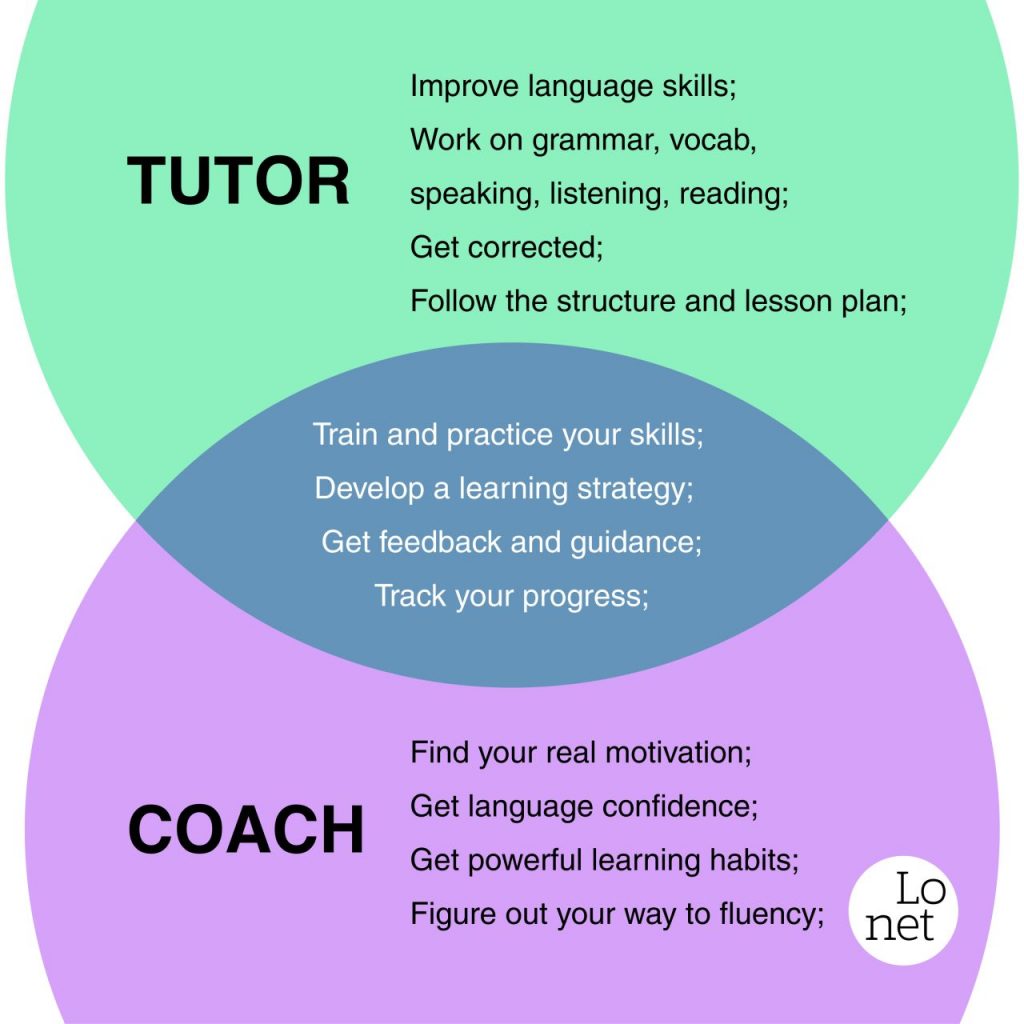
How to use the GROW model to teach English online
One of the latest tendencies in language teaching and tutoring is an active application of some coaching elements. In this article we will have a look at hot to apply the GROW model to teach English online. The GROW model is one of the basic models that coaches follow and it is the most popular one. The GROW is an abbreviation for:
G – Goal
R – Reality
O – Opportunities
W – Will
G – the Goal of the lesson | GROW model in language teaching
Let your learner think about what they would like to achieve in this lesson. They might be surprised with this question in the beginning. This is because they have gotten used to holding the teacher responsible for the result of their learning and they just assume that the teacher knows better.
They might start replying in a vague way saying something like “Well, you are a teacher, so I suppose you will teach me something today.” or “I don’t know …. Maybe we can learn Grammar.” “I want to speak and learn new words”.
Give them time to think | Coaching methods in language teaching
Give them space and just wait a bit without intrusion. Refrain from making any suggestions or recommendations from your side.
Then ask them to specify. “What exactly would you like me to teach you today?”, “What is that in Grammar that you would like to look at today specifically?” “What is a topic that you prefer to speak about?” “What is your idea on the words you would want to learn today?”
If you allow the learner to choose their goals and objectives in their language learning process, they will start moving from “You teach me” to “I learn”. And this is one of the most important steps in the learning process. The learner gets a sense of control and gets awareness about their own responsibility for the results they achieve.
Dig a bit deeper for a bit more specific and measurable goal | GROW model to teach English
For instance, if a learner wants to learn new vocabulary today, then ask them a question “How many new words would you like to get to know today?”
“What kind of words should those be?”
When a learner gets to make it more specific they start evaluating what exactly they actually want and it leads them to the process of a silent chain of self-questioning: how could I use those words, where, who with … why, will this actually improve my skills and why am I here.
Then ask them to write down their goal for today in a concise and precise way.
The inquiry process:
– What do you want to focus on today in this lesson?
– I want to practise speaking and improve my speaking skills.
– That sounds great! What would you prefer to speak about?
– Well… about anything. I just need you to correct my mistakes. We can speak about anything.
– If we had a conversation in your native language, what topic for our discussion would you choose?
– I love travelling! I would speak about different countries.
– About travelling and different countries?
– Yes! I love to travel and I want to speak English freely.
Opening up their “why”…
– That sounds wonderful! Where would you like to go?
– I want to visit New York one day! That’s my dream. To go to New York. But I am afraid that I will not understand the Americans, you know… I have to speak like a native to understand them.
– So what do you want to focus on first, on speaking or on understanding?
– Speaking of course. I need to learn more words.
– How many new words would you like to learn today?
– Hmmm… how many words ….
– Yes….. we have 30 minutes left. How many words do you think you would like to find for you today?
Some limiting beliefs might appear here…
– Ok, my memory is not very good. I always struggle with memorising new words. I keep learning them and then I just forget them. So I think I could learn …maybe 5 new words? Yes! 5 new words are realistic for me to remember. I think.
– Excellent. That sounds like a plan! How are you going to know by the end of the lesson what those new words are?
Be specific and call to action.
– I will write them down.
– Good idea. It makes sense. Where are you going to write them down?
– Oh, one moment. I have to take my notebook. Just a second I will go and get my notebook and a pen.
– So, what is that that you want to do and take away with you from this lesson today?
– I want to speak about travelling and to learn,.. hmm.. to take with me 5 new words about travelling today.
– Can I ask you to write that down please?
– Yes!!! Ok.
The learner is smiling as they write it down.
A sense of control and direction | using the GROW model to teach English
During this process, you can actually see that the learner formulates clearly what exactly they want to achieve by the end of the lesson. This is essential because knowing what they want, what they expect and how they will know they have got it helps the learner to take their own responsibility for doing their best to actually arrive at the goal. It takes away the unease of something unknown. Provides a sense of control and direction.
It also makes it easier for the teacher to organise the lesson and to focus on the specific goal set by the client.
At the end of the day it also gives much clarity to the learner what he is spending his time and money on.

R stands for Reality | the GROW model in language teaching
In this stage explore what your learner already knows and can express on their level of the language skills.
For that you can use a piece of content (a text, an image, an audio material, a short video, an article or any other piece of content available in your library of the materials). Most of the up-to-date learning student books offer a great variety of topics and themes that are very well organised and presented in an engaging way.
For example, for the English language learners The National Geographic Learning offers a great variety of topics and the material is very well organised for the development of all learning skills (listening, reading, writing and speaking).
Topics to teach English include:
- Relationships (describing character, forming adjectives, speaking about important relationships in your life),
- Differences between generation (family influence, immigrant families),
- Storytelling (describing stories, using descriptive words, reacting to stories)
- Science and technology (making predictions about future, appropriate technology, ,
- Art and creativity (unusual street art, describing likes and dislikes, people who are creative in their free time),
- Development (urban features, debating issues, social development, urban development, happy society),
- Alternative travel (holiday activities, voluntourism, historical hotels, ideas for a staycation, getting around),
- Customs and behaviour (raising children, approach to parenting, personal space, traditional rules of behaviour, food and eating habits),
- Hopes and ambitions (emotive language, ambitions, wishes, strong feelings, discussing preferences),
- Talents and experiences (extraordinary careers, job characteristics, a career path, a personal profile, people with unusual talents),
- Money (negotiating, the standard of living, growing service economy, opinion words and phrases, new business ideas),
- and many more.
When you start a topic you actually start checking the reality of the learner.
Where are they now on the scale of their language skills?
Listen carefully, notice mistakes, and make notes.
Don’t interrupt and don’t correct your learner at this stage. Be curious and explore. Ask questions, ask them to describe, to explain, to show and to tell you more ..
Make notes and listen to them. You will be surprised how much they actually can say! How much they actually have to say! And how important is that for them to explain themselves! To be listened to! Without correction. With no interruption and no judgement.
This is it!
When a learner encounters a difficulty to find a word and gets a bit stuck, don’t speak for them.
Wait. This is a very important aspect in the GROW model to teach English.
Let them think, let them find another word or let them look up that piece of vocabulary in a dictionary. Make them feel free and comfortable in their space.
Give them space.
No hurry.
No stress.
Thus you are also showing them your respect and equality. Equality in a Thinking and Speaking Environment. To ensure that happening you need to know that the learners don’t expect your speaking to be their speaking. Even in a hierarchy people can be equal as thinkers and speakers (even if I make mistakes).

Their language capacity is their victory.
They don’t need their victory to be your victory.
Their mistakes are not barriers. They don’t keep you apart. They, in fact, bring you together. If they know you are not trying to correct them now or trying them to be you, they can be truly with you and be themselves and express themselves. And their mistakes don’t matter at this moment as they feel being themselves and authentic.
So they trust. So they can relax. And suddenly they realise that they can grow. They can keep learning. They enjoy learning and they enjoy themselves learning.
Thus during this stage you as a tutor have collected notes and information about what specific language skills need to be corrected and what is the level of the learner.
You’ve got a notion about their pronunciation.
You noticed some repetitive mistakes.
Also you found some grammar issues and/or lexical errors.
And you have noticed what the learner already knows, what structures they operate well and what are the strong skills of the learner.
Furthermore, you’ve got to know about their personality, interests, opinion and challenges.
This all is very valuable data that you have now about your learner as a professional tutor and as a partner for them in their further journey of the language learning. You will have the privilege of helping a human being find the way and crystallise what works best for them in order to achieve their learning goals.
O stands for Opportunities or Options | GROW model to teach English online
At this stage you pay a learner’s attention to some of the mistakes they made while speaking. Be careful not to overwhelm your learner with the corrections if the mistakes are really many. Pick just some of them (I would go for maximum 5), those repetitive ones and the most important at this stage.
For instance, if a learner has a pre-intermediate level of the language and makes grammar mistakes while speaking. You might want to correct present tenses (present simple vs. present continuous) and past tenses (regular and irregular forms). But avoid pointing at mistakes they made while using the second conditional at this stage as this might leave your learner overwhelmed and frustrated.
Now choose several options for the further exercises.
For a tutor the options lie in the area of what type of further training/exercise to go with (reading, listening, speaking or creative tasks) and what method to apply (instructive or a discovery guidance).
For a learner the opportunities would lie in the area of what to put down, what is important to memorise, what they can practically do with that piece of knowledge (piece of vocabulary), what is valuable for them, what matters and what not, what they will want to use, what seems too complicated and how they can say, read, pronounce, spell, hear, understand and apply that piece of knowledge.
The most important part at the opportunities stage is to provide as many different opportunities for the learner to learn that specific piece of knowledge as possible. Which means there must be a creative side applied from both sides – from a learner’s side and from a tutor’s side.
Focus on those pieces of knowledge the learner wanted to learn today and explore them from all possible options: read it, speak it, hear it, play it, write it, spell it, sing it, dance it, draw it, feel it, think it, touch it, show it, taste it, describe it, take it, put it, smell it …as Lonet.Academy says just live it.
During this stage your learner will make a lot of notes, they will write down many things, they will even draw something or make something with their hands. The idea of this stage is to provide as many opportunities to learn as you can.
At the end of this stage ask the learner to tell you what they have written down during this stage.
Initiate “filtering” | Open-end questions in the GROW model to teach English
Use open-end questions starting with “what”:
- What seems most important to you?
- W…. seems most useful?
- What can you start using immediately?
- W…. is the easiest thing to remember?
- What is the most complicated thing?
- What’s the most interesting?
- W…. feels best?
- What sounds best?
- W….. do you want to remember?
- What is important to remember?
- W….. might be important for future?
- What is important right now?
You can create many other filtering and ranking questions in order to get clarity on how all this can be filtered according to their learning and practical relevance.
After the filtering has been done, ask them to go back to their goal of the lesson and encourage them to recite it. This will bring your learner back to the objectives and they will be able to focus again on their specific “takeaway” from this lesson.
W – Way Forward or Will | Coaching for Language Learning
Now let them check what they can take from all the pieces of knowledge they have acquired during the opportunities stage in order to fulfil their goal. Let them choose themselves. Don’t recommend anything and refrain from giving advice. This is their life, their language skills and their goal. Not Yours! Don’t lead. Support! Remember that you are here to be their faithful companion, not to be their instructor or leader.
Taking an example given before (when the goal was to get 5 new words) it might look as follows:
– Can I ask you please go back to your goal for this lesson and tell what was that?
– That was to learn new words.
What was the goal?
– Can you remind me please what exactly was your goal for today?
– Let me see … I have it here … Yeah … it was “Today I want to speak about travelling and learn 5 new words”.
– Thank you. Lovely. So, let’s have a look if you can take what you wanted?
– Oh yes, I actually have more than 5 words. I have many different words in my notes…
– So what are you taking with you from this lesson then?
– I like the word “accommodation”. It can be very useful to know that when I book a hotel. I didn’t know the word “wanderlust”! That’s a beautiful word. I would like to remember that! “Sightseeing” is a difficult word, but I can remember it if I divide it into “sight” and “see”, so yes I want to use this word. “Sunbathing” is also a useful word to me because that’s what I like doing and I didn’t know how to pronounce it correctly. Now I will remember. So … I’ve got 4 words …then one more will be “destination”. I heard this word many times but wasn’t actually sure what it means. So yep! 5 new words!
– Wonderful! I love your choice. I especially love the word “wanderlust”. It sounds romantic.
Repetition and overviewing
While the learner keeps picking those 5 words out of all their notes, they go through all of them again, reading them, repeating them, seeing them again, revising what they mean and pronouncing them again.
Even if they don’t do it loudly, the process is happening in their head. It helps them revise everything they have “gone through” during the lesson.
Now the learner must formulate their will.
What will they do with their new knowledge?
- What will you do with these new words that you are taking with you?
- I will google the word “wanderlust” to read what people write about it. Maybe there are some interesting articles about wanderlust.
- I will write “accommodation” when I book my next trip.
- When people ask me what I like doing on holiday I will say “sunbathing”.
- I will notice this word “destination” now … I think I can see it in the airport or on the tickets.
This stage of WILL works in a way of affirmation. Again, it helps the learner to connect their knowledge to their reality, gives it a sense of practical value and shows the future perspective.
Now the learner leaves the lesson with a sense of completion, achievement and progress.
